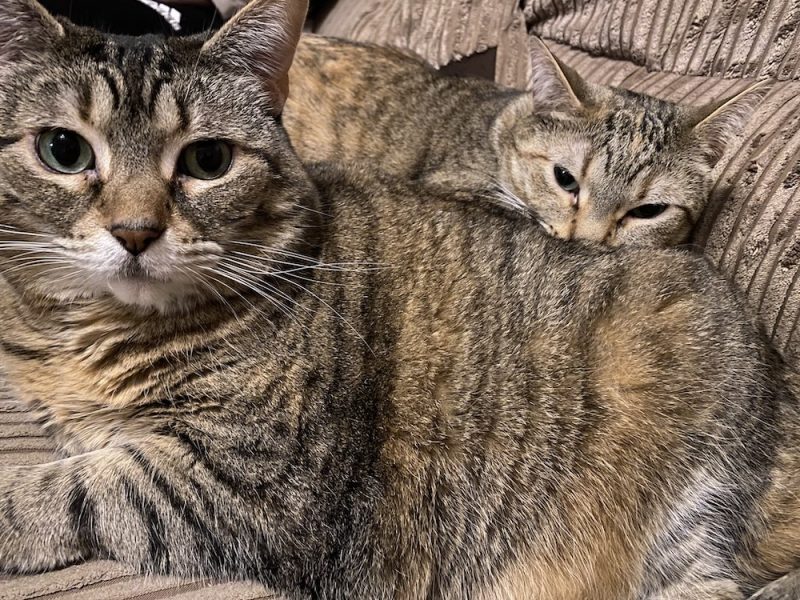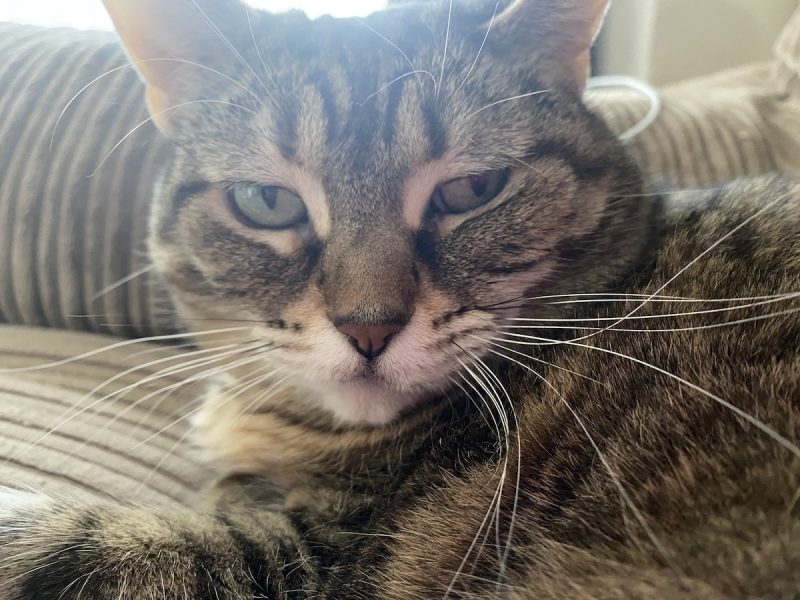Hello, I’m Dr. Lauren. To learn more about me and my two adventurous cats, Pancake and Tiller, please read my introduction.
Spaying or neutering a cat can bring up a variety of complicated emotions: anxiety about the procedure, anxiety about the anesthesia, concerns about how to help your cat with the recovery process, guilt about making the decision to have the surgery in the first place, etc. I know how difficult it can be, because I’ve had two of my own cats spayed or neutered, and the anxiety before, during, and after surgery was real.
This article is intended to help you, the pet owner, make an informed decision about the importance of these procedures and what actions you can take to make them go smoothly, safely and guilt-free.
Basics of spay/neuter surgery
Spaying and neutering, simply put, is the surgical removal of the reproductive organs from a female or male cat, also known colloquially as neutering or spaying. Technically, it can be done on cats of any age, but there are strong reasons to do it while your cat is still young, which we’ll discuss shortly.
So why, as a veterinarian, do I strongly recommend spaying or neutering cats?
- Spaying female cats before their first heat cycle significantly reduces their incidence of mammary cancer. Because feline mammary cancer is highly aggressive and ultimately fatal, the opportunity to reduce this risk is important.
- Whether your cat is male or female, neutering reduces unwanted behaviors in your pet cat, such as marking inside the house, meowing during heat, wandering, etc. And an intact male cat’s urine definitely stinks!
- The number of stray cats is staggering. Spaying and neutering cats will reduce the number of stray cats.
How to reduce guilt
GuiltGuilt can be a strong emotion and has no single root cause. It is often accompanied by self-consciousness and regret about yourself and your actions. When choosing to neuter your cat, guilt can stem from a variety of thoughts. You may feel guilty about causing your cat stress, about negating its reproductive capabilities, about the changes that may occur in your cat after the surgery, or about your cat being “angry” with you.
- If you are feeling guilty, one of the most important things is to talk about it. You want to be as comfortable as possible on the day of surgery, so the sooner the better. Talk to your vet first. If necessary, tell them specifically why and set up an appointment so they can ease your anxiety. Talk to your family too. Family often influences decisions and so do guilt. Worries can also manifest as guilt, so take the time to think through any worries you have.
- Don’t anthropomorphize. Cats don’t experience the same emotions as we do. We’re not saying cats don’t have emotions, but they don’t worry or get stressed the same way we do (as far as we know). What you’re worried about may be inconsequential to your cat. Cats are more interested in when dinner is coming and less interested in what’s going to happen tomorrow.
- If you’re worried about feeling guilty after surgery, rest assured: many of the fears people have about their cats being less lovable or being upset about their choice to have the surgery are generally unfounded.
- Take action. Use the steps below to help you take action and find ways to feel more in control of the situation, which will help you feel less helpless and less guilty. Also, read the “Pet Owner’s Pain Manual” I wrote a few posts ago to get a better understanding of what to look out for to keep your cat as comfortable as possible after surgery.

How to prepare to reduce guilt
Many people can reduce their feelings of guilt by taking action. First, know what to expect during your surgery. Asking for a checklist, doing some background work, and making a plan for the day before, the day of, and after your surgery can help. As the famous slogan from the 80s goes, knowing is half the battle.
The day before surgery
- Veterinarians will often tell you to fast your cat at some point – ask to be sure – but water is generally allowed.
- Don’t wait until today to take out the carrier, as this is often a sign of change for your cat. Instead, allow the carrier to be available for a few days in advance. Keep a favorite toy or a blanket that smells like home in the carrier as well.
- You can decide whether or not to microchip your cat at the surgery. This is a good time to do the surgery, as your cat will be under anesthesia. Unfortunately, lost cats cannot tell us where they came from, so this is highly recommended by the veterinary community.
On the day of surgery
- Know the techniques for putting your cat in a carrier and use them instead of just cramming it in, which is stressful for everyone involved.
- If you have sibling cats, consider having them for surgery on the same day so they will have the same funny smell and may become nervous if one cat smells different from the other after a day at the vet.
- Write down any questions you have and ask them when you drop off or pick up your child.
- Know the best phone number to contact you today and the times you will be unavailable and communicate this to your vet.
- Before you bring your cat home, find out what is normal and expected after surgery. Have a phone number to call if you have any concerns. Do my cat’s stitches need care or are they all internal?

The day after surgery
- Know what medications to give and when to start
- Know when retesting is necessary
- If in doubt,
Most experts agree that spaying or neutering is the right choice for your cat, and you shouldn’t feel guilty about making the choice.
There’s an old saying in surgery that “every cut is a chance to heal,” and when it comes to neutering your cat, this couldn’t be more true.
This article is part of a series by Dr. Lauren, Dr. Pancake, and Dr. Tiller.




